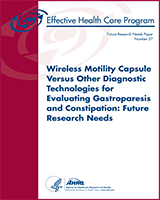Comparative diagnostic accuracy of WMC for gastroparesis.
KQ 1: In the evaluation of gastric dysmotility, how does the WMC alone compare with gastric scintigraphy, antroduodenal manometry, and endoscopy in terms of diagnostic accuracy of gastric emptying delay, motility assessment, treatment decisions, patient-centered outcomes, harms, and resource utilization? | Seven studies evaluated diagnosis of gastric emptying delay. We found low strength of evidence that WMC alone was comparable to scintigraphy for diagnostic accuracy, motility assessment, treatment decisions, and resource utilization. | Low |
Incremental diagnostic accuracy for WMC in combination with other diagnostic methods for gastroparesis.
KQ 2: When gastric scintigraphy, antroduodenal manometry, or endoscopy is used in the evaluation of gastric dysmotility, what is the incremental value of also using the WMC in terms of diagnostic accuracy of gastric emptying delay, motility assessment, treatment decisions, patient-centered outcomes, harms, and resource utilization? | We found two studies evaluating WMC as an add-on to other testing. The strength of evidence was low for diagnostic accuracy and motility assessment of WMC in combination with other modalities. The addition of WMC increased diagnostic yield. | Low |
Comparative diagnostic accuracy of WMC for slow-transit constipation.
KQ 3: In the evaluation of colonic dysmotility, how does the WMC alone compare with radiopaque markers and scintigraphy in terms of diagnostic accuracy of slow-transit constipation, motility assessment, treatment decisions, patient-centered outcomes, harms, and resource utilization? | Nine studies analyzed colon transit disorders and provided moderate strength of evidence for diagnostic accuracy, motility assessment, and harms. WMC was comparable to radiopaque markers. Few harms were reported. The evidence was insufficient to draw conclusions about effects of WMC on treatment decisions and resource utilization. | Low |
Incremental diagnostic accuracy for WMC in combination with other diagnostic methods for slow-transit constipation.
KQ 4: When a radiopaque marker or scintigraphy is used in the evaluation of colonic dysmotility, what is the incremental value of also using the WMC in terms of diagnostic accuracy of slow-transit constipation, motility assessment, treatment decisions, patient-centered outcomes, harms, and resource utilization? | No studies directly assessed use of WMC in combination with other tests to detect colon transit delay. | Insufficient |
